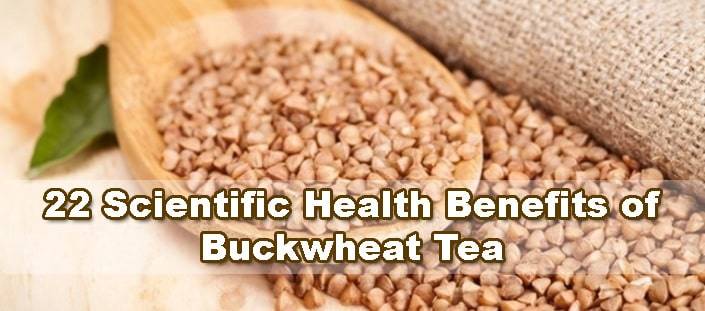What are health benefits of Buckwheat Tea? Looking for an ideal gluten-free option to speed up your weight loss process? Would you like to add a healthy and different drink to your diet?
If yes, Buckwheat tea provides great health benefits and does not contain gluten. Would you like to know more? Continue reading this article!
Table of Contents
What is Buckwheat?
Buckwheat is a plant found in many grain cereals but not in any of grain species. It is used frequently in bread and pasta because has grain like wheat.
Buckwheat tea is produced from seeds of plant. It tastes light and is also used for fun except for health purposes.
Studies have shown that it helps weight loss, improves health of blood vessels, and reduces blood cholesterol. Preliminary research on buckwheat tea is promising and suggests that nutrients and chemicals in tea can be used as nutritional supplements.

What are Benefits of Buckwheat Tea?
Prevents Edema Formation
According to a study published in Journal of European Pharmacology, buckwheat tea is very effective in treatment of edema swelling caused by Chronic Venous Insufficiency.
The study was given to a group of buckwheat tea while other patients were given placebo tea and performed on human patients.
Researchers, buckwheat tea consuming patients, patients in other group noted that a significant improvement.
The study says that tea is safe, has a positive effect on edema patients with Chronic Venous Insufficiency and can prevent progression of edema.
Important For Cardiovascular Health
A Prospective Study of 220 postmenopausal women who complained about cardiovascular disease (CVD) published in American Heart Journal found that consuming buckwheat tea at least six times a week is beneficial to control signs and progression of cardiovascular disease.
It also helps protect against other common health problems in postmenopausal women including high blood pressure and high cholesterol.
Reduces Blood Sugar
In an article published in Journal of Agriculture and Food Chemistry, is stated that buckwheat tea or concentrates reduce blood glucose levels in diabetic rats.
However, preparation of tea or concentrates has been carried out differently than normal method.
Improves Kidney Function
When buckwheat concentrate or high-density tea was intentionally administered to rats exposed to kidney damage, a significant improvement in renal function was observed and slowed progression of kidney disease.
However, experiment has not yet been tested in humans, but is expected to give similar results in people with kidney problems.
Useful in Treatment Diabetes
In one study, components found in buckwheat tea were found to be useful in lowering blood sugar levels in diabetic mice.
The routine is very useful in prevention of type 2 diabetes when used with new methods. Another placebo-controlled study concluded that buckwheat seed extract or tea was deliberately reduced in blood glucose levels from 12 to 19% after 90 and 120 minutes after administration, after being given to laboratory animals with diabetes.
On the other hand, no glucose reduction was observed in placebo group animals.
Scientists believe that a chiro-inositol compound, which plays an important role in cell signals and glucose metabolism in animals and humans, has a lowering effect on glucose.
Researchers believe that chiro-inositol can act as insulin and increase insulin sensitivity in body cells.

Increases Ovarian Function
According to a human study published in New England Journal of Medicine, buckwheat seeds and grains are loaded with D-chiro-inositol, which increases insulin levels in patients suffering from polycystic ovary syndrome.
Thus, it contributes to improving ovulation function, lowering blood pressure levels, reducing serum androgen and plasma triglyceride concentrations.
Protects Against Cancer and Heart Disease
Phytonutrients in cereals and whole grains, such as buckwheat, are extremely useful in improving digestion and some stomach and gallbladder problems.
The buckwheat plant contains a kind of friendly flora known to protect body against breast cancer and other hormone-dependent cancers and heart disease.
Although content of leptin in beverages such as buckwheat tea or coffee is relatively low, regular consumption significantly improves body’s ability to fight cancer and reduces heart problems.
Buckwheat tea is very rich in water soluble, insoluble and fat soluble antioxidants. Tocotrienols are rich in various foods, including vitamin E, phenolic acids, selenium and phytonutrients.
These are very useful in improving immune level of body. Antioxidants fight toxic free radicals in body, thus providing protection against harmful viral, bacterial and fungal infections.
Helps You Lose Weight
It can be considered non-calorie and therefore is an ideal alternative to high-calorie drinks. When consumed instead of high-calorie drinks, helps you lose weight.
Although there is little evidence of effect of this tea on weight loss, researchers believe that catechin, a naturally occurring antioxidant, can support weight loss.
A detailed study of Obesity found that extracts in green tea contain catechin, which is renowned for helping with weight control.
Decaffeinated Drink
Green tea is rich in antioxidants and is useful for weight loss and general health. However, if you need to reduce amount of caffeine in your diet and apply a low-oxalate diet, it is more useful if you do not consume.
Buckwheat tea is the best alternative to this. It contains all benefits of green tea and can be an ideal choice for those who want to prevent formation of kidney stones.
It improves vitexin and routine blood flow in buckwheat tea and prevents varicose veins and edema in leg.
Read Next: Green Tea: Health Benefits, Uses, Types,Damages And Recommendations
How to Use Buckwheat Tea?
- According to research, chronic ball-vein disorders in foot, calf and legs; Tension sensation, swelling, pain, calf cramps, foot burning, itches, numbness, drowsiness, calves and feet are used against feeling of weight.
- Homeopathy has been shown to cause diarrhea such as diarrhea, cramps, skin rash, skin inflammation, asthma and sinusitis in animals eating more than buckwheat.
- Buckwheat is completely used against these skin diseases. Buckwheat tincture is used against skin itching and vaginal itching in women.
- It does not take form of dough when wheat flour is kneaded like normal wheat flour. It is used in life. Buckwheat tea flour has 3-4 times more nutritious and strengthening properties than other grain flour.
- Normal flour floured with buckwheat flour, fatigue, fatigue, dullness and drowsiness are not seen as such.
- A red color is mixed into water while buckwheat tea bulgur or a short boiled before cooking from seed.
- This is so-called Fagopyrin, which is lightweight and after this red water has been removed, other normal cooking processes begin.
Buckwheat Tea: 2 coffee spoons of buckwheat herb is put into pot and 300-400ml of boiling water is added and then infused for 5-10 minutes.
What Are Side Effects of Buckwheat Tea?
x No known side effect when used in accordance with recipe.
x If seeds are boiled with boiling water before cooking, Fagopyrin, which gives a red color in combination, mixes with water and after this water is discarded, other processes continue.
x It has not been shown that buckwheat grass or seeds do not cause any harm to people. But some animals eat excessive amounts of buckwheat, itching, diarrhea, allergies, asthma.
x It has been observed that causes discomfort.
Recommended Articles
- Tarragon Tea: Health Benefits, Uses, Recipes And Dosage
- 16 Incredible Health Benefits Of Mate Tea – What Benefits Does it Have?
- 11 Fantastic Health Benefits Of Seaweed Tea + Recipe And Warnings
- Blueberry Tea: Top 10 Blueberry Tea Benefits for the Heart, Eye & More








Thanks a lot to know about buckwheat tea.
Very interesting information for me.